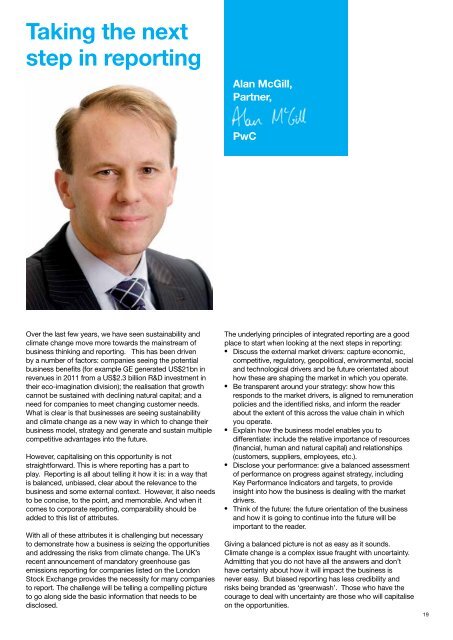CDP-FTSE-350-Climate-Change-Report-2012
CDP-FTSE-350-Climate-Change-Report-2012
CDP-FTSE-350-Climate-Change-Report-2012
Create successful ePaper yourself
Turn your PDF publications into a flip-book with our unique Google optimized e-Paper software.
Taking the next<br />
step in reporting<br />
Over the last few years, we have seen sustainability and<br />
climate change move more towards the mainstream of<br />
business thinking and reporting. This has been driven<br />
by a number of factors: companies seeing the potential<br />
business benefits (for example GE generated US$21bn in<br />
revenues in 2011 from a US$2.3 billion R&D investment in<br />
their eco-imagination division); the realisation that growth<br />
cannot be sustained with declining natural capital; and a<br />
need for companies to meet changing customer needs.<br />
What is clear is that businesses are seeing sustainability<br />
and climate change as a new way in which to change their<br />
business model, strategy and generate and sustain multiple<br />
competitive advantages into the future.<br />
However, capitalising on this opportunity is not<br />
straightforward. This is where reporting has a part to<br />
play. <strong>Report</strong>ing is all about telling it how it is: in a way that<br />
is balanced, unbiased, clear about the relevance to the<br />
business and some external context. However, it also needs<br />
to be concise, to the point, and memorable. And when it<br />
comes to corporate reporting, comparability should be<br />
added to this list of attributes.<br />
With all of these attributes it is challenging but necessary<br />
to demonstrate how a business is seizing the opportunities<br />
and addressing the risks from climate change. The UK’s<br />
recent announcement of mandatory greenhouse gas<br />
emissions reporting for companies listed on the London<br />
Stock Exchange provides the necessity for many companies<br />
to report. The challenge will be telling a compelling picture<br />
to go along side the basic information that needs to be<br />
disclosed.<br />
Alan McGill,<br />
Partner,<br />
PwC<br />
The underlying principles of integrated reporting are a good<br />
place to start when looking at the next steps in reporting:<br />
• Discuss the external market drivers: capture economic,<br />
competitive, regulatory, geopolitical, environmental, social<br />
and technological drivers and be future orientated about<br />
how these are shaping the market in which you operate.<br />
• Be transparent around your strategy: show how this<br />
responds to the market drivers, is aligned to remuneration<br />
policies and the identified risks, and inform the reader<br />
about the extent of this across the value chain in which<br />
you operate.<br />
• Explain how the business model enables you to<br />
differentiate: include the relative importance of resources<br />
(financial, human and natural capital) and relationships<br />
(customers, suppliers, employees, etc.).<br />
• Disclose your performance: give a balanced assessment<br />
of performance on progress against strategy, including<br />
Key Performance Indicators and targets, to provide<br />
insight into how the business is dealing with the market<br />
drivers.<br />
• Think of the future: the future orientation of the business<br />
and how it is going to continue into the future will be<br />
important to the reader.<br />
Giving a balanced picture is not as easy as it sounds.<br />
<strong>Climate</strong> change is a complex issue fraught with uncertainty.<br />
Admitting that you do not have all the answers and don’t<br />
have certainty about how it will impact the business is<br />
never easy. But biased reporting has less credibility and<br />
risks being branded as ‘greenwash’. Those who have the<br />
courage to deal with uncertainty are those who will capitalise<br />
on the opportunities.<br />
19


